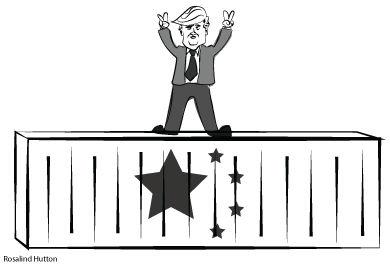According to Jacob Pramuk of CNBC, last week, President Donald Trump announced plans to keep his $250 billion of tariffs on Chinese imports. While sticking to his guns is admirable, Trump’s decision here hurts the overall economy.
To understand why tariffs are undesirable, you first must understand what they are. Tariffs are a tax, but instead of it being on individual people, it is a tax on things entering the country. Overall, taxes on individual items are bad for the economy; they create what is called a deadweight loss.
Due to the laws of supply and demand, every good produced has a certain equilibrium price and quantity at which it will be bought and produced. When a tax on a certain good is implemented, the price is moved up above the equilibrium level, creating inefficiencies in the market and producing deadweight on the economy.
In other words, lower quantities are produced, and these quantities also cost more than what people perceive they should be paying for them, so consumers buy less. The economy as a whole is losing on this extra production, and more importantly, many consumers lose out on buying things they once could.
When you apply this to international trade, the same thing happens. Consumers have fewer options at a higher price because of the deadweight put on the world economy by a tariff.
So, if tariffs make goods cost more and lower the amount of a goods made and bought, why do governments put them in place?
It is primarily to protect individual groups of people—in Trump’s case, steelworkers. Trump is trying to corner his own market, the market of votes. According to Rex Nutting of MarketWatch, the region with the most workers in steel production are located “battleground states” in the Midwest.
This is not the first time a president has tried this. In 1930, former President Herbert Hoover and Congress passed the Smoot-Hawley Tariff, raising already high U.S. tariffs to even higher levels in order to protect farmers.
The result was European retaliation, and overall trade in the world went down 66 percent, as reported by Will Kenton of Investopedia. This put even more strain on the world economy as it tried to fight through the Depression.
Retaliation is what is happening now due to these tariffs. China, the second biggest economy in the world, has put $110 billion in tariffs on the U.S. This leads to less overall trade throughout the world, which is bad for everyone. The reason behind the trade war, the U.S. trade deficit, is nothing more than a scare tactic used by politicians. It has little, if any, negative impact on the economy.
For one, it is heavily misunderstood. The trade deficit is offset by a capital investment surplus, while the U.S. spends money importing goods from other countries, other countries use that money to invest in U.S. companies instead of buying goods.
The two offset each other. An example of this is when a Japanese car company spends money to open a plant in the U.S., creating jobs with their capital investment. Even if steelworkers lose jobs, new jobs pop-up due to capital investment.
Plus, all a trade deficit shows is how consumers in the country have money to spend abroad. If the economy was worse off and people had less to spend, the trade deficit would shrink.
Another reason the trade deficit is irrelevant is everyone, at least on a personal level, operates on one. I know I do. When I go to Chick-Fil-A and buy a chicken sandwich, I am operating at a trade deficit with Chick-Fil-A. This is why trade is good.
Even when you are at a deficit, you are getting goods at a lower cost than you would be making them on your own. If Chick-Fil-A is more efficient and produces better chicken sandwiches than I can make at home, it makes the most sense for me to buy from them.
The same principle applies to the world scale if China makes steel more efficiently than the U.S. and can sell it at a cheaper price than the U.S. can, the U.S. benefits more from buying Chinese steel than making their own.
The tariffs on steel hurt everyone as they drive steel prices up and reduce the amount of steel bought. What happens is, companies making things out of steel, like Ford and Chevrolet, spend more to make cars, which means it costs more to buy cars. This in turn means the greater public spends more than they normally would on cars and have less disposable income to spend on other things. This lowers their overall options on how to spend their money. This also applies to those steelworkers who benefit from the tariffs. You could argue they really do not net gain because of the increase in production across the board in steel.
Overall, tariffs are inherently bad for the U.S. and world economies. The reason protectionist policies like this are put in place is for a president or party to gain votes. The trade deficit does not matter, and we should worry more about finding the best price for something, regardless of where it is, than making sure it is U.S. made.
Categories:
Trump hurts the U.S. economy by keeping tariffs in place

Tariffs
0
Donate to The Reflector
Your donation will support the student journalists of Mississippi State University. Your contribution will allow us to purchase equipment and cover our annual website hosting costs.
More to Discover





